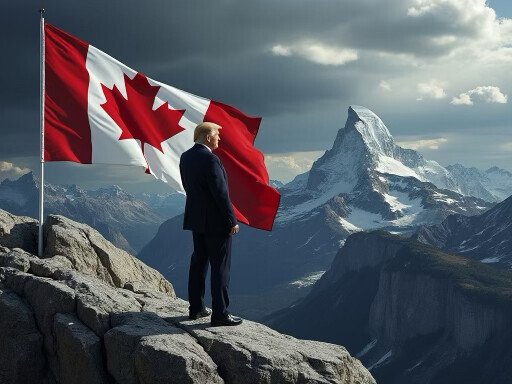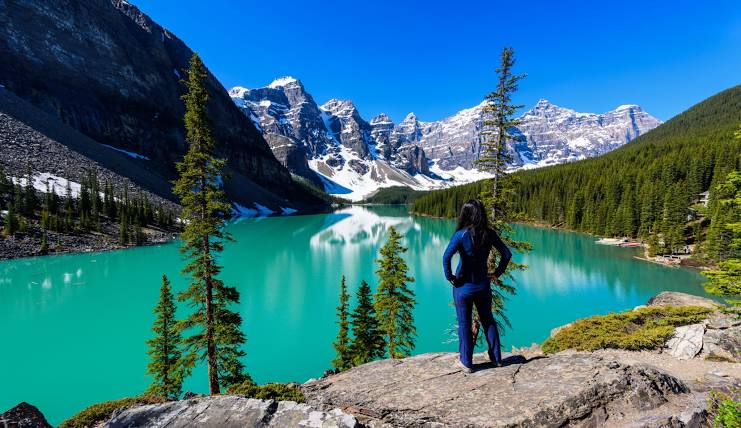As if on cue, a short article from the Chamber of Shipping notes that cargo from China is being rerouted to avoid tariffs.
The destination of the cargo is, wait for it,… CANADA!
USCoS – As U.S. tariffs on Chinese goods soar to as high as 145%, a growing number of companies are rerouting shipments to Canada and storing them in bonded warehouses in hopes of avoiding the duties and capitalising on a future rollback. This strategy has caused a sharp spike in Chinese shipments to Canada, with logistics firms and customs brokers reporting surging inquiries and storage demand from consumer goods, chemical, and auto parts sectors. However, experts caution that prolonged storage costs—estimated at $1,750 per container per week—and limited warehouse capacity could force sellers to offload discounted goods into the Canadian market, potentially disrupting domestic manufacturing. Others warn the strategy is risky and unsustainable, especially if the trade conflict drags into next year’s U.S.-Mexico-Canada Agreement negotiations. (link)
This will not end well….
… For Canada.
_______________________________________________________________________
_______________________________________________________________________
Against the backdrop of Alberta, Canada proceeding with a plan to separate from the land of the Snow Mexican leftists, a leaked video conference call between U.S. President Trump, Alberta Premier Danielle Smith, Doug Ford and Prime Minister Mark Carney is created.
Keith Wilson provides the created leaked content for review. WATCH:
— Keith Wilson, K.C. (@ikwilson) May 3, 2025
.
A very solid argument can be made that something akin to the Alberta-U.S. merging was the plan all along. {DEEP BACKGROUND}

Alberta is a province in Western Canada. Its landscape encompasses mountains, prairies, desert badlands and vast coniferous forests. It has more than 600 lakes, and rich mineral deposits. In the west, the Canadian Rocky Mountain Parks have glaciers in the Columbia Icefields. The Waterton Glacier International Peace Park is a biosphere reserve that straddles the southern border with the USA.
http://May 1, 2025 Challenging unconstitutional net-zero legislation
Challenging unconstitutional net-zero legislation
The ineffective federal net-zero electricity regulations will not reduce emissions or benefit Albertans but will increase costs and lead to supply shortages.
The risk of power outages during a hot summer or the depths of harsh winter cold snaps, are not unrealistic outcomes if these regulations are implemented. According to the Alberta Electric System Operator’s analysis, the regulations in question would make Alberta’s electricity system more than 100 times less reliable than the province’s supply adequacy standard. Albertans expect their electricity to remain affordable and reliable, but implementation of these regulations could increase costs by a staggering 35 per cent.
Canada’s constitution is clear. Provinces have exclusive jurisdiction over the development, conservation and management of sites and facilities in the province for the generation and production of electrical energy. That is why Alberta’s government is referring the constitutionality of the federal government’s recent net-zero electricity regulations to the Court of Appeal of Alberta.
“The federal government refused to work collaboratively or listen to Canadians while developing these regulations. The results are ineffective, unachievable and irresponsible, and place Albertans’ livelihoods – and more importantly, lives – at significant risk. Our government will not accept unconstitutional net-zero regulations that leave Albertans vulnerable to blackouts in the middle of summer and winter when they need electricity the most.”Danielle Smith, Premier
“The introduction of the Clean Electricity Regulations in Alberta by the federal government is another example of dangerous federal overreach. These regulations will create unpredictable power outages in the months when Albertans need reliable energy the most. They will also cause power prices to soar in Alberta, which will hit our vulnerable the hardest.”Mickey Amery, Minister of Justice and Attorney General
Finalized in December 2024, the federal electricity regulations impose strict carbon limits on fossil fuel power, in an attempt to force a net-zero grid, an unachievable target given current technology and infrastructure. The reliance on unproven technologies makes it almost impossible to operate natural gas plants without costly upgrades, threatening investment, grid reliability, and Alberta’s energy security.
“Ottawa’s electricity regulations will leave Albertans in the dark. They aren’t about reducing emissions – they are unconstitutional, ideological activist policies based on standards that can’t be met and technology that doesn’t exist. It will drive away investment and punish businesses, provinces and families for using natural gas for reliable, dispatchable power. We will not put families at risk from safety and affordability impacts – rationing power during the coldest days of the year – and we will continue to stand up for Albertans.”Rebecca Schulz, Minister of Environment and Protected Areas
On Thursday, Alberta Premier Danielle Smith was asked about her personal position on Alberta separating from Canada.
Smith responded by saying that she believes in “Alberta’s sovereignty within a United Canada.”
Smith’s government has proposed legislation that would make it easier for citizens to call for a referendum on seceding from Canada.
Meanwhile, Chief Sheldon Sunshine of Sturgeon Lake Cree Nation and Mikisew Cree Nation Chief Billy-Joe Tuccaro said in a letter that the premier is enabling a referendum on separation, and a “fanatical cell of individuals,” when Canadians need to unite against U.S. tariffs.
To which Smith replied Thursday, saying “Any Albertan can put an idea forward on any topic. And if they’re able to get the number of signatures, then it would go to a vote, that includes a vote of members of First Nations and we encourage Indigenous peoples to participate.”
Captain Convey Comment

We see you President Trump.
Were coming soon.
Alberta wants to be the 51st state.
Help us make it happen.
What is the population of Alberta in 2025?
Statistics Canada says the population of Alberta grew at a faster pace than all other provinces and territories. The organization has released its latest population estimates. It says Alberta was home to 4,960,097 residents as of January 1, 2025, an increase of 168,221 people or 3.51 per cent over the last year.
People are fleeing to Alberta from other places in Canada just like they
are fleeing Democrate controlled states in the US to other states that
are conservative and safer.
If Canada falls apart as expected Alberta will be the first to be welcomed
into the union.
Its a real possibility.